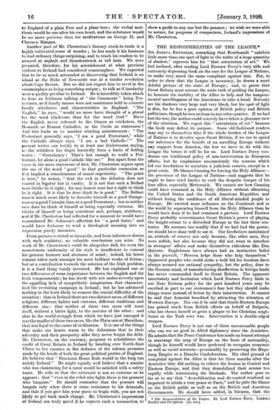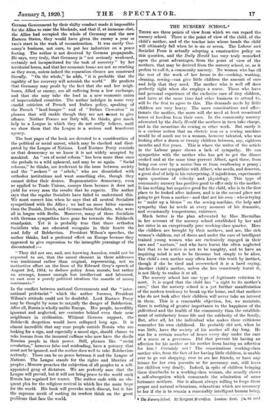THE RESPONSIBILITIES OF THE LEAGUE.*
SIR Josmua REYNOLDS, remarking that Rembrandt " exhibits little more than one spot of light in the midst of a large quantity of shadow," reproves him for " that ostentation of art." We feel inclined, after reading Lord Eustace Percy's very able and extremely depressing book on the case for the League of Nations, to make very much the same complaint against him. For, in order to show that the League is necessary, he draws a most doleful picture of the state of Europe ; and, to prove that Great Britain must assume the main task of guiding the League, he laments the inability of the Allies to help and the tempera- mental unwillingness of the Americans to take a hand. Not only are his shadows very large and very black, but his spot of light is dim, for he has a poor opinion of British policy and British politicians, though he sees no hope in any other quarter. If we had lost the war, the author could scarcely have taken a gloomier view of the situation. We regret this " ostentation of art " because the book may defeat its purpose. Some old-fashioned readers may say to themselves that if the whole burden of the League of Nations is to devolve upon Great Britain, if we are to spend our substance for the benefit of an unwilling Europe without any support from America, the less we have to do with the League the better it will be for us. Lord Eustace Percy con- demns our traditional policy of non-intervention in European affairs, but he emphasizes unconsciously the reasons which led our forefathers to maintain a judicious reserve, except in a great crisis. He blames Canning for leaving the Holy Alliance— the precursor of the League of Nations—and suggests that he ought to have tried harder to curb the despotic temper of his four allies, especially Metternich. We cannot see how Canning could have remained in the Holy Alliance without alienating the United States and the South American Republics, and without losing the confidence of all liberal-minded people in Europe. He exerted more influence on the Continent and in the world by separating himself from the Holy Alliance than he would have done if he had remained a partner. Lord Eustace Percy probably overestimates Great Britain's power of playing the knight-errant to a disturbed Europe in the last three cen- turies. He assumes too readily that if we had had the power, we should have done well to use it. Our forefathers maintained an attitude of reserve not only because, like other men, they were selfish, but also because they did not want to interfere in strangers' affairs and make themselves ridiculous like Don Quixote. Englishmen have always had an instinctive belief in the proverb, " Heaven helps those who help themselves." Oppressed peoples who could make a bold bid for freedom have always aroused our national sympathy, but the policy, dear to the German mind, of manufacturing disaffection in foreign lands has never commended itself to Great Britain. The apparent uncertainty and hesitation which Lord Eustace Percy finds in our Near Eastern policy for the past hundred years may be ascribed in part to our statesmen's fear lest they should make things worse instead of better by their intervention. It cannot be said that Armenia benefited by attracting the attention of Western Europe. Nor can it be said that South-Eastern Europe has gained much from British efforts on behalf of Bulgaria, who has shown herself as great a plague to her Christian neigh- bours as the Turk ever was. Intervention is a double-edged weapon.
Lord Eustace Percy is not one of those unreasonable people who can see no good in Allied diplomacy since the Armistice. He admits that the Peace Conference has made an honest attempt to rearrange the map of Europe on the basis of nationality, though he himself would have preferred to recognize economic as well as racial interests—presumably by preserving the Haps- burg Empire as a Danube Confederation. His chief ground of complaint against the Allies is that for three months after the Armistice they did nothing to relieve the famine in Central and Eastern Europe, and that they demobilized their armies too rapidly while maintaining the blockade. The author goes so far as to say that " demobilization and de-control rendered us impotent to attain a true peace at Paris," and he puts the blame on the British public as well as on the British and American Governments. He should have added, in fairness, that the
• The Responsibilities of the League. By Lord Eustace Percy. London: Hodder and Stoughton. [Os. net.)
German Government by their shifty conduct made it impossible for the Allies to raise the blockade, and that if, at immense chat, the Allies had occupied the whole of Germany and the new Eastern States, they would have given the enemy a year or two's start in the work of reconstruction. It was surely Ger- many's business, not ours, to put her industries on a peace footing. The author is not deceived by German propaganda. He says, very truly, that Germany is " not seriously weakened, certainly not incapacitated for• the task of recovery " by her territorial losses, and that her economic losses are not so crushing as they seem, unless indeed the reparation clauses are construed literally. " On the whole," he adds, " it is probable that the rapidity of her recovery will astonish the world." He predicts that Germany may profit by the fact that she and her neigh- bours, Allied or enemy, are all suffering from a low exchange, and that she may take the lead in a new economic union of impoverished countries. The author indulges in some very candid criticism of French and Italian policy, speaking of the French " land-hunger " and of " Italian Caesariam " in phrases that will rankle though they are not steant to give offence. Neither France nor Italy will, he thinks, give much help to a League in which they do not really believe, until we show them that the League is a serious and beneficent agency.
The best pages of the book are devoted to a consideration of the political or social unrest, which may be checked and dissi- pated by the League of Nations. Lord Eustace Percy reminds us that democracy as we know it is not widely accepted by mankind. An " era of social reform " has been more than once the prelude to a wild upheaval, and may be so again. " Social reforms," he thinks, are irrelevant to the issue between society and the " seekers " or " rebels," who are dissatisfied with orthodox institutions and want something else, though they cannot define their desires. Representative democracy, even as applied to Trade Unions, annoys them because it does not yield for every man the results that he expects. The author says that the regular Socialists have failed to understand this. We must correct him when he says that all neutral Socialists sympathized with the Allies ; we had no more bitter enemies than the Danish, Dutch, and German-Swiss Socialists, who were all in league with Berlin. Moreover, many of these Socialists with German sympathies have gone far towards the Bolshevik standpoint. Yet it is probably true that those orthodox Socialists who are educated recognize in their hearts the mad folly of Bolshevism. President Wilson's speeches, the author thinks, had a profound effect on Europe because they appeared to give expression to the intangible yearnings of the discontented:— "They did not see, and, not knowing America, could not be expected to see, that the moral element in these addresses was traditional rather than original, representing, not an instinctive effort on the lines of Sir Edward Grey's speech of August 3rd, 1914, to deduce policy from morals, but rather an attempt, honest enough but intellectual and laboured, to cast over a purely political idealism the mantle of moral sentiments."
In the conflict between national Governments and the " inter- national proletariat" which the author foresees, President Wilson's attitude could not be doubtful. Lord Eustace Percy may be thought by some to magnify the danger of Bolshevism. After all, Russia is wholly unlike Europe. Her people, incredibly ignorant and neglected, are centuries behind even their near neighbours in civilization. Without German support, the Bolshevik despotism would have collapsed long ago. It is almost incredible that any sane people outside Russia who are loOking for a sign, and especially a moral sign, should choose to take lessons from the immoral ruffians who now have the docile Russian people in their power. Still, phrases like " social revolution," however false and misleading, have a potency that must not be ignored. and the author does well to take Bolshevism seriously. There can be no peace between it and the League of Nations. The League stands for the rights and liberties of peoples ; Moscow preaches the subjection of all peoples to a self- appointed gang of dictators. We are perfectly sure that the League will prevail, but it will not bring peace to the world until Russia has regained her senses. The author ends with an elo- quent plea for the religious revival in which lies the main hope for the world. His book will provoke much dissent, but it has the supreme merit of making its readers think on the great problems that face the world.











































 Previous page
Previous page